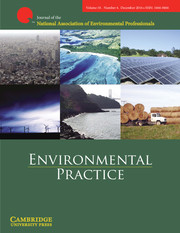Article contents
RESEARCH ARTICLE: Creating Environmental Stakeholder Profiles: A Tool for Dispute Management
Published online by Cambridge University Press: 17 October 2005
Abstract
In Israel, the same governmental bodies and environmental organizations appear repeatedly as environmental disputants. Irrespective of the conflict, they usually hold consistent perspectives and positions. This research offers a methodology for identifying values frames and creating stakeholder profiles to assist negotiators and disputants in finding common ground or trade-offs in resolving disputes. The profiles enable stakeholders to couch their interests and arguments in language (or frames) understandable to other stakeholders. They enable interveners to steer discussions toward trade-offs or reframing of issues. The research is based on interviews with 160 stakeholders in nine Israeli environmental disputes at national, regional, and local levels.
- Type
- FEATURES & REVIEWS
- Information
- Copyright
- © 2005 National Association of Environmental Professionals
References
REFERENCES
- 8
- Cited by


